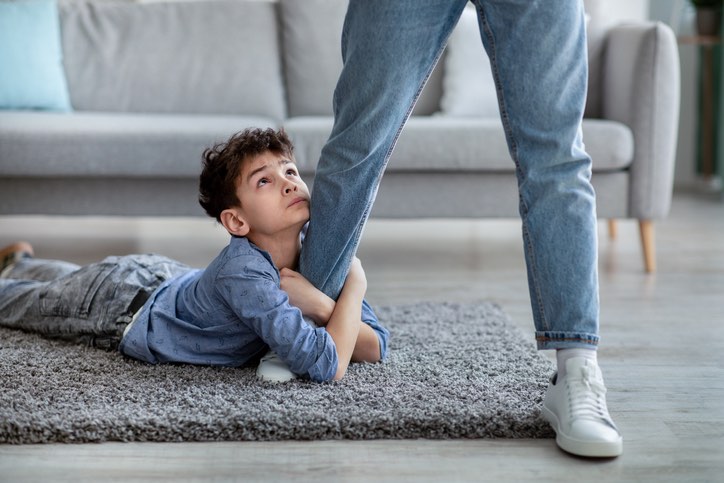How Does Lack of Attention Affect Child Development?

Many parents and caregivers might worry about whether they’re giving their children enough attention. After all, it’s vital for children to feel loved and supported.
While children need to have time to explore and play on their own, sometimes children are left on their own too much and might feel they don’t get enough attention from their parents or caregivers. In this case, several negative outcomes might occur.
Related: 5 Tips for Giving Each Child One-on-One Time
What is an Uninvolved Parenting Style
An uninvolved or neglectful parenting style is characterized by a lack of involvement in a child’s life. Parents who use this approach typically have little to no communication with their children and provide them with little or no emotional support.

Uninvolved parents tend to be less involved in their children’s education and activities. They may also neglect their children’s basic needs, like food, clothing, and transportation.
It is important to note that just because a parent is busy with work or other obligations does not mean they are an uninvolved parent.
While parents may work a lot of hours, they are not uninvolved if they spend some of their free time with their kids and ensure their children are cared for by someone.
An uninvolved parent doesn’t make any space or accommodations for their child’s needs, while a busy parent makes sure their child’s needs are met, even if they aren’t the one to meet them.
What Are the Negative Consequences of Uninvolved Parents on Child Development?
There are many ways in which lack of attention can affect child development, and this can vary depending on the age of the child.
What is the Effect of Lack of Attention on Infants and Toddlers?

Many things can affect the development of a baby, and one of the most important is the amount of attention they receive from their parents. A lack of attention can negatively impact an infant’s attachment to their caregiver, which is a fundamental task of early childhood development.
In early childhood, infants and preschoolers develop attachments to their caregivers through mutual interaction and communication. Babies learn to trust and rely on their caregivers through repeated positive experiences, such as being fed, held, and comforted.
This trust allows babies to explore their surroundings and develop relationships with others. If an infant doesn’t get enough attention from their caregiver, they may develop an insecure attachment.
This can lead to problems later in life, such as problems with self-esteem and social skills.
What is the Effect of Lack of Attention on Young Children?

There is a lot of research that suggests that a lack of attention can have a negative effect on kids. One research study on childhood abuse and neglect found that kids who didn’t get enough attention were more likely to have problems in school and in relationships. They were also more likely to get in trouble with the law.
Another study on the effects of early childhood deprivation found that kids who didn’t get enough attention were more likely to have poor executive function and self-regulation. This study also found that early neglect negatively impacted a child’s brain development.
What is the Effect of Lack of Attention on Adolescents?

You might think that teenagers want to be left alone by their parents, but teenagers still need attention. As they mature and become independent, they may enjoy more freedom, but they still need guidance and support from their parents.
Lack of attention can have a negative effect on teenagers. They may feel neglected and unsupported, which can lead to mental health problems such as depression, anxiety, and low self-esteem.
Teenagers who don’t feel loved and cared for may be more likely to engage in risky behaviors, such as drug and alcohol abuse, or unsafe sex.
What are the Signs of Lack of Attention?
One of the most apparent signs that a child isn’t getting enough attention is that they’re constantly seeking attention from others, especially adults. They may be disruptive in class, frequently interrupting others, or talking out of turn.
Kids who are often ignored by their families may also be clingy and demanding of their parents’ time.

Another sign is that a child may be overly aggressive or destructive. They may have problems with impulse control and be quick to anger. They may also have difficulties with social interactions and exhibit signs of loneliness or isolation.
A lack of attention can also lead to problems in school. A child may have difficulty paying attention in class or may struggle with academic subjects or develop a low sense of self-worth.
Do Kids Act Out Due to a Lack of Attention?
Many developmental psychology experts believe that a lack of attention can lead to mental health and behavioral problems in children, including acting out.
One reason why kids may act out is that they are looking for attention. If they feel that they are not getting enough attention from their parents or caregivers, they may start acting out to get noticed.
Differences Between Positive and Negative Attention
Positive attention is often rewarding, while negative attention is often punishing. Positive attention usually involves praising or complimenting a child, while negative attention often involves yelling or scolding.
- Positive attention usually makes a child feel happy and loved, while negative attention often makes a child feel anxious or scared.
- Positive attention is usually given when a child does something good, while negative attention is often given when a child does something bad.

- Positive attention helps a child feel good about themselves, while negative attention often makes them feel bad about themselves.
- Positive attention teaches a child that they are loved and valued, while negative attention teaches a child that they are not acceptable the way they are.

Overall, positive attention is much better for a child than negative attention. Positive attention helps a child feel good about themselves, learn to trust and rely on others, and feel loved and supported.
Negative attention often does the opposite. Only showing negative attention towards a child can reinforce bad habits and cause kids to act out in other areas of their lives such as in school or with their friends.
What are Ways Parents Can Show Attention to Their Children?
As a parent, there are many different ways that you can show attention to your children, even if you’re busy or spend a lot of time working.
1. Show Genuine Interest in Their Hobbies
When your child is telling you about their latest Roblox game or a recent episode of Peppa Pig, show genuine interest in what they have to say. Ask them questions, listen thoughtfully, and make eye contact to show that you’re listening.
Even if you don’t find the topic interesting, treat it as something that someone you love cares about deeply. This kind of attention will be meaningful to them.
2. Schedule Family Time
Make a point to schedule time when you can spend time together as a family. If your family is large or you have multiple children, make a point to spend time one-on-one with your child every so often. This individual attention can create lasting memories for your child.
3. Develop Routines and Rituals
Whether cuddling together and reading a bedtime story each night, walking to the park in the afternoon or making pancakes together on Sunday mornings, create unique routines and rituals with your child.
4. Take Intentional Breaks from Work

If you’re still checking email and feeling stressed about work projects, you may be physically away from work but not mentally.
When you’re away from work, whether on the weekend or on vacation, be intentional about stepping away. And be intentional about stepping away and connecting with your child.
5. Find Ways to Connect When Apart

Even when you can’t be together, you can still find ways to connect with your child and show them attention.
Whether you stay in touch by sending texts and emails, video chatting, or even mailing cards, you can still give your child attention when you’re physically apart.
It is important to remember that all kids need attention, but there is no singular right way to give it to them. Some kids may need more attention than others, and others may require different types of attention.
Listen to your child’s cues, talk to them, and follow their lead when it comes to giving them attention.
–
To get more ideas on how to bond with your kids and spend more time together, read up on 10 Ways to Spend Quality Time with Your Children.

